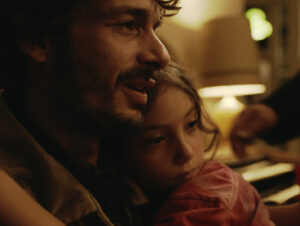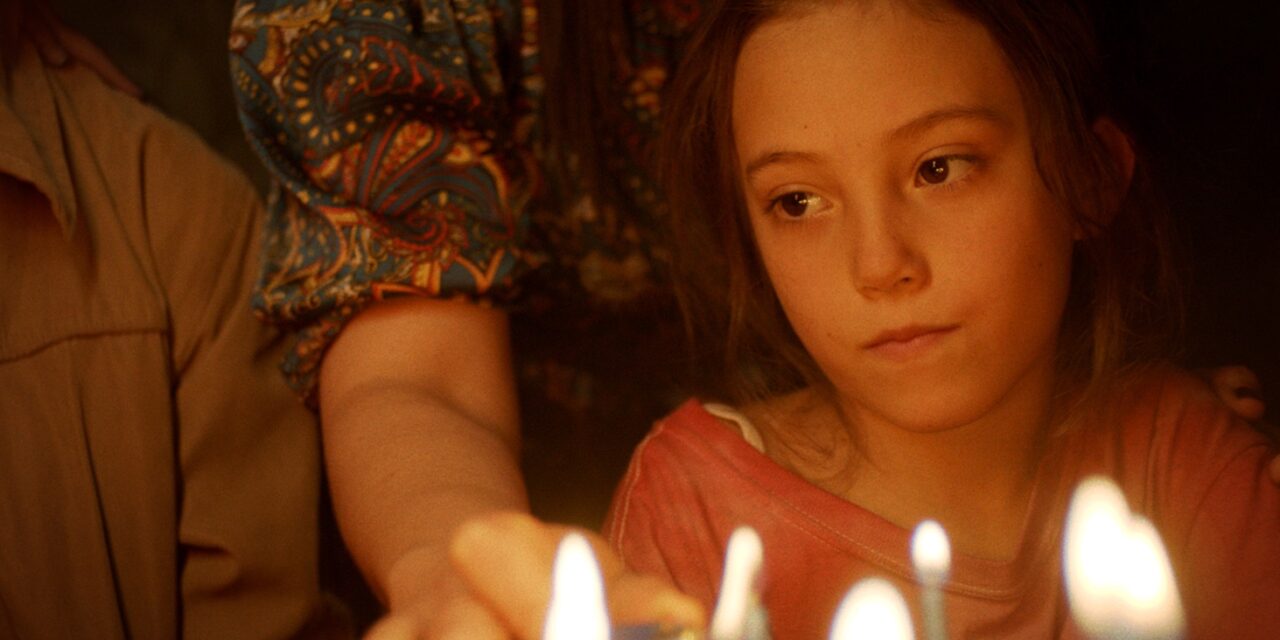Testing Our Resolve
Questions related to immigration have been asked with increasing frequency in recent years. This has been particularly true where illegal entry has been concerned, providing considerable fodder for widespread public debate. But what of legal immigration – is that a benign subject, one worthy of little attention or recognition? Indeed, if would-be immigrants are doing everything by the book, there shouldn’t be any concerns, right? The answer to that might not be as simple as it seems, as illustrated in the gripping Spanish drama, “Upon Entry” (“La Ilegada”) (web site, trailer).
Diego (Alberto Ammann), an urban planner, and Elena (Bruna Cusí), a contemporary dancer, have gone to great lengths to change their lives. The couple lives in Barcelona, Spain, but they have meticulously made extensive arrangements to relocate to the US to begin again, primarily to advance their careers and join family members who have already made the move. They look forward to this new opportunity, confident that they have done everything necessary to ensure a smooth transition. And, as they head off to New York for a connecting flight to Miami, their eventual destination, they’re optimistic about what lies ahead.

Would-be immigrants Diego (Alberto Ammann, left) and Elena (Bruna Cusí, right) face harsh and unexpected scrutiny from authorities after landing in New York, as seen in the edgy Spanish drama, “Upon Entry” (“La Ilegada”), now available for streaming on Tubi TV. Photo courtesy of Zabriskie Films.
Upon arrival in New York, however, they’re in for a rude awakening. While they sincerely believe that all of their immigration papers are in order, they’re nevertheless pulled aside as they’re processed through customs. Diego and Elena are escorted to a secondary screening room, where they’re told to have a seat and await further instructions. They ask questions that go unanswered and are often met with gruff, terse responses as authorities bark out commands to them. Needless to say, they’re perplexed by what’s unfolding and concerned about what it might mean.
Before long, Diego and Elena are taken to a private interrogation room, where they’re met by Agent Vásquez (Laura Gómez), a no-nonsense inquisitor who asks hard-edged questions, often giving them little time to provide answers and virtually no time to offer explanations or elaboration. There’s also little indication of where this questioning is heading or what’s behind it, leaving Diego and Elena even more confused. And, when they note that they’re running out of time to make their connecting flight, they’re summarily told that they should forget all about that.
Not long thereafter, Agent Vásquez is joined by a colleague, Agent Barrett (Ben Temple), another tough-as-nails official who tag-teams his partner in asking additional questions, either individually or collectively with Diego and Elena. The inquiries grow progressively more intrusive, as if the agents are prying into the duo’s private life to validate the truthfulness of their responses. For example, Diego is grilled about the sincerity of his feelings for Elena, a line of questioning aimed at determining whether his relationship with her is as genuine as he contends or a matter of convenience for preferential treatment regarding their immigration status. Authorities are especially interested in this because of how quickly the couple became romantically involved after he broke off relations with an old flame, a relationship that Diego never discussed with Elena, an eye-opening revelation for her. And, thanks to these interrogation tactics, it’s not long before the trust between Diego and Elena appears to begin eroding.
There’s also the question of Diego’s Venezuelan heritage, having left his troubled homeland before relocating to Barcelona. Diego’s desire to now come to the US through Spain raises skepticism among the agents in light of the strained relations that currently exist between America and Venezuela. Is Diego legitimately pursuing a lawful course to immigrate to the US, or has he concocted a questionably clandestine scheme to accomplish his goal by way of a trumped-up romantic relationship with a Spanish woman (someone who, on her own, would come under less scrutiny than someone partnered to an individual of his background)? Indeed, should Diego be discovered to be pulling off a fast one, he could be deported directly back to Venezuela (not Spain) and denied any future chance at filing an immigration claim to come to the US. This naturally raises further suspicions in the minds of the agents, not to mention additional doubts in the heart of Elena.
To make matters worse, as the interrogation wears on, the couple grows increasingly reluctant to cooperate, particularly when the agents aren’t forthcoming about their intents or any clear basis for their line of questioning. Diego and Elena are pushed to the brink, refusing to cave in to the pressure but reaching the point where they can’t help but wonder whether their dream is going to be fulfilled. They’re clearly drained by this ordeal, but they’re in doubt about what’s going to transpire with their plan – and with each other.

Immigration Agents Vásquez (Laura Gómez, left) and Barrett (Ben Temple, right) subject a pair of new arrivals to unduly harsh questioning, trying to identify the intents behind their immigration plans, as seen in the edgy Spanish drama, “Upon Entry” (“La Ilegada”), now available for streaming on Tubi TV. Photo courtesy of Zabriskie Films.
So what exactly is going on here? Do the agents have concrete evidence to question the sincerity of the couple’s intentions? After all, when it comes to their immigration preparations, they appear to have nearly everything solidly nailed down; except for the failure to dot a few i’s and cross a few t’s, all seems in order, and they’ve substantially proved that it in their completed paperwork. So does that mean authorities have other means of confirming their suspicions, or are they on some kind of fishing expedition? Indeed, what’s prompting them to believe that something is truly amiss? No matter what underlies their actions, it hasn’t stopped them from engaging in their brutal interrogation, with their leading questions, accusatory tone and inferences that plant nagging seeds of doubt in the minds of Diego and Elena.
The key to understanding this, of course, rests with the beliefs of those asking and answering the questions, for those notions play a central role in how events play out and are ultimately responsible for the manifestation of our existence. It’s unclear if any of the principals in this drama are aware of this school of thought, but the means driving it clearly have a pivotal role to play as evidenced by how matters unfold here.
So what beliefs are at work here? That’s hard to say, because the intents aren’t completely clear. Are the agents asking questions based on their beliefs in some kind of concealed evidence? Or are they following some kind of standardized interrogation protocol used in situations where they have suspicions about what could be transpiring without hard evidence to back up such speculation, a tactic designed to draw out potentially hidden truths? If it’s the former, the responses would likely validate whatever evidence they have. And, if it’s the latter, the answers would either confirm or dismiss their suspicions, but the questions will have helped them arrive at such conclusions either way.
As for those being interrogated, the questions would either enable them to remain resolute in their truth or expose any attempted hidden deception, the results, of course, reflecting what they believe in their hearts. In addition, the questioning could also be seen as a sort of litmus test for the veracity of the partners’ relationship, specifically the faith and trust they place in one another. For instance, is Diego being square with Elena about the sincerity of his intentions, both as a romantic partner and as someone who’s sincerely seeking to make a new life with her (as opposed to using her as a means to an end)? Scenarios like this can be difficult to endure, but sometimes they can help to reveal strengths – and weaknesses – in relationships, even if the subject matter of the interrogation bears no direct connection to the partnership itself.
However, the foregoing considerations aside, there are some additional concerns to bear in mind here, specifically with regard to policies regarding the process of immigration. As noted above, illegal immigration is a subject of great debate these days, and good arguments exist on each side of the issue as to what we should believe about it and, hence, how we should proceed in handling it. But, also as noted earlier, what about legal immigration, the subject at the heart of this story? Is it really necessary for would-be immigrants to be subjected to such intense and intimidating scrutiny, especially if they appear to have done everything correctly? Indeed, if there were red flags that needed to be investigated, shouldn’t they have been looked into before the couple arrived in New York? In light of that, then, these practices raise the question, what exactly do we believe about the nature of immigration in the first place? Are we truly walking our talk on this matter, or are we being hypocrites? Do we genuinely believe what we claim, or are these contentions some kind of window dressing, smoke screen or camouflage?

Would-be immigrant Diego (Alberto Ammann) faces tough questions from authorities about his Venezuelan heritage and his romantic relationships after landing in New York, as seen in the gripping Spanish drama, “Upon Entry” (“La Ilegada”), recipient of three Independent Spirit Award nominations. Photo courtesy of Zabriskie Films.
Let’s consider the facts. As a nation, the US generally has a history of welcoming immigrants who follow the proper legal protocols. They have played a vital role in the growth and development of this country, providing us with rich cultural, artistic and technological contributions. The diversity this practice has afforded American society has made the US a model for other countries to follow. It’s been a win-win situation all around.
However, when we see incidents like this play out, all of those ideals and aspirations get thrown into doubt. Do we mean what we say? If so, however, then why are individuals who are acting in good faith subjected to unsavory practices like this (which, by the way, aren’t necessarily recent developments, either)? And, if that’s how we really feel, then why are we sending out mixed messages to those wishing to come here? Given the track record of immigrant contributions, as well as current issues related to labor shortages in a wide array of employment sectors, why would we make these circumstances so needlessly difficult, especially when they appear to fly in the face of everything we supposedly claim?
This is not to suggest throwing caution to the wind. It’s certainly reasonable to diligently employ prudent security precautions in immigration and customs practices. But, as events unfold here, we can’t help but observe that the US might be a nation moving from a standpoint of legitimate suspicion to one of rampant paranoia. If we’ve truly reached a point where we have inherent doubts about not only illegal but also legal immigration, we need to step back and assess our beliefs about this practice. Do we want it to continue? Do we recognize the benefits it can afford us? And, if we don’t believe that the advantages outweigh the risks, then what are we going to do about it? Can we be honest with others – and ourselves – about what we truly believe about this subject? And, if so, can we make the appropriate adjustments in our policies and protocols with regard to it? Implementing such changes may not be easy if we decide to adopt them, but the toughest part may come up front where the core of this issue rests – in our beliefs.

Would-be immigrant Elena (Bruna Cusí) learns previously undisclosed secrets about her partner during questioning from government authorities in “Upon Entry” (“La Ilegada”), the gripping debut feature from the writing-directing duo of Alejandro Rojas and Juan Sebastián Vasquez. Photo courtesy of Zabriskie Films.
Welcome to America, land of the free and home of the brave, a sanctuary for the world’s poor, tired and huddled masses. Or is it? That’s the question uncomfortably raised in this gripping, edgy debut feature from the writing-directing duo of Alejandro Rojas and Juan Sebastián Vasquez. It begs the question, is this the America we want? And, if so, then why would anyone want to come here in the first place, even when making a diligently concerted effort to follow all of the legally sanctioned protocols? This film sends a powerful message, spotlighting issues disturbingly brought to light by the film’s meticulously scripted writing, which keeps characters and viewers alike guessing about what’s playing out. Although crafted very much like a stage play, the film never comes across as stilted or stagey, thanks in large part to the superb performances of the four principals, who effectively convey the anguish and fright being wrought on screen. This Tubi TV offering is highly deserving of its three Independent Spirit Award nominations for best first feature, best first screenplay and best editing, even if it’s also the kind of picture that makes audiences uneasy – but, then, maybe that’s the point behind it, too, a goal at which it succeeds brilliantly.
What we believe, either individually or collectively, can have wide-ranging implications, sometimes extending far beyond our immediate surroundings, even affecting individuals we don’t know or have never met. For what they’re worth, though, those beliefs may have impact – and may even potentially inflict harm – on others. We may not be aware of this, but, as members of a society to whose policies we may tacitly consent, we could be just as responsible for them as those who devise and enforce them in the first place. This behooves us to stay informed of what’s going on and providing our feedback when these policies and practices don’t jibe with our beliefs, as may be the case with incidents like those depicted in this film. Looking the other way won’t make these issues go away, something we must never lose sight of if we profess to be citizens of a society that holds itself out as everything it claims to be.
A complete review is available by clicking here.
March Movies and More!

Join yours truly and show host Frankie Picasso for looks at four new films, as well as a glimpse at one of 2024’s first film festivals, on the upcoming movie review edition of the Frankiesense & More video podcast, to begin airing Thursday March 7 at 1 pm ET. We’ll also present our Oscar predictions for the top six award categories, which you can read more about in my blog on the subject, available by clicking here. Tune in on Facebook or YouTube for all the fun and lively discussion!
Celebrating Life in the Face of Death
It’s never easy to face difficult situations, especially when they’re impending and it seems as though they’re inevitable, circumstances in which there’s nothing we can do about them. Indeed, it’s hard enough for us as adults to process and cope with such conditions, but how are children supposed to handle these kinds of situations? Youngsters seldom possess the experience and wisdom needed to deal with their feelings, leaving them unable to address their emotions and outlooks and to find ways to get by. These events can lead to devastating if not irreparable damage that can scar them for life. But are there ways of handling such scenarios that minimize the impact? Those are the issues beautifully and sensitively examined in the touching new Mexican comedy-drama, “Tótem” (web site, trailer).
Nine-year-old Sol (Naíma Sentíes) should be spending the carefree days of youth enjoying life and having fun. But that’s not easy, or at times even possible, given that her young father, Tona (Mateo García Elizondo), a gifted painter, is struggling with a debilitating form of cancer, a condition that’s been getting worse and appears to be heading into its final stages. Sol has difficulty understanding how someone so young has become so weak and frail. She believes that someone his age, with so much talent and potential, should be vibrant and vital, so her dad’s illness truly mystifies her. What’s more, she’s having trouble processing the idea that he’s reluctant to see her. She’s confused, convinced that she’s done something wrong or that he doesn’t like her, when, in fact, his reluctance stems from the fact that he’s uncomfortable with his daughter seeing him in such a depleted state. Sol thus struggles to cope with both Tona’s failing health and his ongoing unexplained absence from her life.

It’s difficult for a frightened young girl, Sol (Naíma Sentíes), to enjoy the festivities of a birthday party when faced with the prospect of losing her dad, as seen in the latest offering from writer-director Lila Avilés, “Tótem.” Photo courtesy of Janus Films.
Sol is not the only one having difficulty dealing with these circumstances. Tona’s sisters, Nuria (Montserrat Marañon) and Aléjandra (Marisol Gasé), provide for the daily needs of their brother with the aid of a professional caregiver, Cruz (Teresita Sánchez). Together, they make sure Tona has a roof over his head and vigilantly attend to his well-being. But, given that they’re so close to the situation, they witness the heartbreak of Tona’s decline firsthand, making for trying circumstances and prompting them to look for ways to cope. Then there’s Lucia (Iazua Amador), Sol’s mother, who has the dual responsibility of attempting to assist in the management of both Tona’s physical state and their daughter’s emotional health. The four women do their best to meet these challenges, but, after all, they’re only human. They thus each struggle to come up with their own means of addressing this difficult situation, some of which create additional issues of their own.
Of course, when trying to lift someone’s spirits, it doesn’t help to let one’s own feelings of despair become apparent, in this case for both Tona and Sol. So, to counter the prevailing sense of gloom, the family decides to throw a birthday party for Tona. He’s not particularly keen on the idea, given his worsening health and his dread of loved ones seeing how far he has slid. But his relatives insist on holding the party, whether or not he chooses to make an appearance. The event is intended not only to acknowledge that he has made it to yet another birthday, but also to provide an opportunity for his family and friends to show him how much he means to them, a celebration of life – and, everyone hopes, a meaningful one at that. After all, this could well be the last chance for something like this to take place.
But efforts aimed at promoting Tona’s well-being involve more than just throwing him a party. For instance, Uncle Napo (Juan Francisco Maldonado) spends considerable time looking into various treatment options. Likewise, Aléjandra is willing to try implementing alternative approaches, including practices based on native Mexican spiritual beliefs, such as having the house smudged with sage by a colorful shamanic practitioner, Lúdica (Marisela Villarreal), and conducting meditative prayer circle sessions with the entire family.
And, through all this, everyone pitches in to help Sol cope with everything that’s going on around her. She’s experiencing a wide range of emotions, from sorrow to confusion to anger, and she’s having difficulty understanding how to express them under the circumstances. But it often seems that things are so big that they’re more than she can handle.

Cancer victim Tona (Mateo García Elizondo, left) shares a rare tender moment with his scared young daughter, Sol (Naíma Sentíes, right), in the sensitive, touching new Mexican comedy-drama, “Tótem.” Photo courtesy of Janus Films.
In some ways, this would appear to be a no-win situation all the way around. But is giving up a truly viable option? There must be a way to evoke some good out of circumstances like these, but how can it be achieved? The starting point for an undertaking like this begins with our beliefs, for these powerful tools shape what emerges in our existence. It’s unclear how many of us are aware of or seek to implement this school of thought. However, given the breadth of possible beliefs, this thinking provides us with the means to materialize a virtually infinite range of options, including finding ways to draw the good out of seemingly otherwise-dire conditions. Or, in this case, helping to provide love, meaning and support to a dying man and a scared little girl at a critical time in the unfolding of their lives.
Using our beliefs to attain these results, however, requires an important first step – thinking outside the box, letting go of limitations to envision possibilities that may not have been conceived of before. And, admittedly, under circumstances like these, that could be challenging, as these kinds of conditions could be extremely distracting, keeping us from letting our consciousness flow freely to devise imaginative and effective solutions. Nevertheless, should we be able to surpass such barriers, we can thus allow ourselves to come up with a host of unimagined options.
As noted above, that’s especially crucial where both Sol and Tona are concerned. They need relief from the oppressive conditions weighing on them. And, in Sol’s case, it’s also essential for providing clarity in her thinking. Her worries have obviously gotten in the way of enabling her to see things clearly, planting errant beliefs in her mind that, unfortunately, have a way of clouding her judgment and putting elements into place in her existence that are both off-base and don’t serve her well-being.
This is also true, to a certain extent, where other family members are concerned. Consider Nuria’s case, for example. She’s distraught over her brother’s condition, and that distraction is getting in the way of her carrying out seemingly simple tasks, like baking a birthday cake. It doesn’t help that these beliefs have also prompted her to engage in excessive drinking, a behavior that has contributed to the foregoing anxiety and the beliefs that feed into it, as well as creating new problems of their own.
Similarly, there’s the quiet despair of Roberto (Alberto Amador), Tona’s aging father, who has himself experienced his share of health-related issues. He feels helpless to assist in his son’s care, given his own well-being challenges, and dreads the thought of outliving one of his children. Such beliefs evoke occasional emotional outbursts, his anger at the circumstances getting the better of him.
This is where the value of inventive solutions comes into play. Not only do they have the potential to make things better, but they have the power to help relieve the stress on those closest to Tona and Sol. Aléjandra’s hiring of the “house cleaner,” for instance, is an attempt at employing something alternative to help create a more soothing (and possibly healing) environment for Tona. And, even if it doesn’t work, it beats doing nothing and letting the prevailing conditions take over unfettered.
And then, of course, there are the festivities themselves, which are the central focus of the film’s story. The family truly wants to make the celebration fun and special for Tona and Sol, given that there may not be any more after this one. They arrange an extensive, diverse, joyful event for the guest of honor, one that’s somewhat challenging to pull off in light of the expense involved. So much of the household income goes to paying for Tona’s medical bills and caregiving that it makes things financially tight for throwing a big party. But the family believes it’s worth it, both as a celebration of Tona’s birthday and as a celebration of his life. It’s hard to imagine a more fitting and more uplifting tribute to someone facing the prospect of impending death.

Nuria (Montserrat Marañon), sister of a dying man, struggles with his impending fate by imbibing in excessive drinking as a coping mechanism, as seen in the touching new Mexican comedy-drama, “Tótem.” Photo courtesy of Limerencia Films.
As hard as it may be to imagine, there’s a great deal of fun going on here, both for the characters and viewers alike (especially during the smudging sequence). It’s somewhat surprising to see how much comic relief has been incorporated into this picture’s narrative. But it serves a useful purpose, showing the characters how it’s possible to stay upbeat under conditions like these. It also gives the audience some much-needed breathing room during the course of what can sometimes be a difficult, tearful watch. To that end, it lends considerable credence to the idea that “laughter is the best medicine.” It may not provide a cure, but it can certainly offer relief at a time when it’s needed most. That’s food for thought for any of us facing situations like this.
The everyday lives of average individuals ordinarily might not make for especially engaging storytelling. However, when they’re framed within the context of extraordinary circumstances, they take on an added new dimension, as witnessed in this second offering from Mexican writer-director Lila Avilés. This warm, heartfelt, bittersweet comedy-drama tells a simple yet endearing story of a family preparing a birthday celebration under trying conditions, often involving comparatively mundane tasks with delightfully funny twists and sublimely heartfelt moments as we witness the various means with which the celebrant’s relatives are dealing (or not dealing) with what lies ahead. Yet what might seem destined to be an exercise in forced festivities with an underlying sense of morbidity turns out to be a loving, earnest celebration of life, despite the undeniable presence of an unwanted, intangible “guest” lingering in the background. While the film incorporates a few sequences that are inherently a little too incidental in nature compared to the larger overall narrative, “Tótem” nevertheless serves up a charming, touching, authentically presented tale that reaches out to audiences and surrounds them with sincere, loving feelings and a big, well-earned hug.
This National Board of Review winner and Independent Spirit Award nominee is a fine, little-known indie gem that will surely move you, even if it leaves you with uncomfortably mixed feelings as its story unfolds. It effectively illustrates that there indeed can be times of boundless, overwhelming joy even in the face of overwhelming lament but that what ultimately matters most is what we make of these circumstances when they play out, especially when it comes to expressing how we feel for those whom we truly care about most. The film has been playing in limited arthouse theater release and is likely to be available for streaming in the near future.
As much as we might want to try to deny it, death eventually comes to us all (and often seemingly too soon). This is why we need to make the most of our lives while we have the chance, both for ourselves and others. And, even when the end approaches, we still have an opportunity to make our existence fulfilling beyond measure, celebrating our being for all its worth and what it has meant both to ourselves and those we care about. Even if we’re facing the prospect of blowing out our candles for the final time, that doesn’t mean it’s not something to be commemorated with joy, gusto and a hearty salute. May all of our days be so festive and meaningful, right up until the very last one.
A complete review is available by clicking here.
Copyright © 2024, by Brent Marchant. All rights reserved







Recent Comments